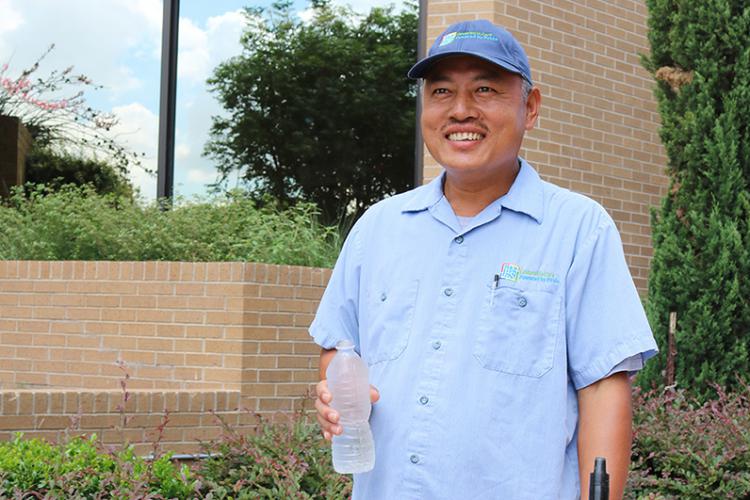
Doctors encourage patients to get plenty of exercise but that can be tough during a Texas summer. The physicians at JPS Sports Medicine work with athletes preparing for football, band and other outdoor activities, as well as people who exercise for fitness.
“Hydration is everything. Dehydration puts people at risk of many things when working in the heat, from making them more prone to injury to heat illness,” says Jason Mogonye, MD, Associate Director of Sports Medicine at JPS. “Prevention is key. Hydration is the mainstay, but appropriate clothing, slowly acclimatizing to the heat, and planning outside activities for cooler parts of the day can help go a long way to remain healthy in the heat.”
Last year, the JPS Emergency Department treated 103 patients from June 1 to August 31, for dehydration.
We asked Dr. Mogonye about the importance of making sure that you drink enough water to power through the toughest outdoor workout.
How do I know if I am dehydrated?
One of the earliest signs of dehydration is thirst. It is the body’s natural way of letting you know to take in fluid.
Other symptoms can include dry mouth, headache, fast heart rate, and loss of skin elasticity. As dehydration becomes severe, you may feel lightheaded, weak or be unable to sweat.
The color of your urine can also give you a clue. Clear, colorless urine means you are sufficiently hydrated. Very dark, yellow urine likely means you need more to drink.
How do doctors diagnose dehydration and what’s the treatment?
Most of the time doctors can diagnose dehydration based on whether the patient has lost fluid from heavy sweating or problems such as vomiting and diarrhea and the symptoms you tell them you’re having. There are lab tests that can be done in some cases when it isn’t as clear.
The treatment, although it sounds simple, is to replace the fluids that were lost. The easiest way is to do this is by drinking; however, if you are unable to drink, you may need IV fluids.
How much liquid should I be drinking anyway?
The amount of fluid intake a person needs every day varies widely on several factors, including your age, gender, body size, and activity level. In general, the Center for Disease Control and Prevention recommends that men get 3.7 liters of fluid each day (from all sources including food and beverage). That’s about 15.5 cups per day. It recommends 2.7 liters per day for women, or about 11.5 cups.
You should replace fluids lost from sweat by drinking that same amount. For example, if you lose a liter of fluid due to sweating, you should replace that by drinking a liter of fluid. This also means if you lose 2 pounds of body weight due to sweating, you should drink two pounds of fluid (that’s about a liter of water).
Drinks with caffeine, such as coffee and cola, are not recommended as replacements because caffeine acts as a diuretic – it can cause more fluid loss. Also, be aware that while sports drinks are good for rehydration, some contain large amounts of sugar, and may even have as many calories as a soda.
When should you seek medical attention?
You should seek medical attention for dehydration if you are not able to adequately replace the fluids. This may be due to vomiting or if you are losing fluid too fast to replace it.
Anyone who has been in the heat and begins to show signs of cramping, nausea, vomiting, headache, changes in personality, or loss of consciousness should be removed from the heat and evaluated by a healthcare professional, such as an athletic trainer or doctor.
Seek emergency help if the person is unable to take fluid in by drinking, or they have muscle weakness, or are confused or unconscious.
